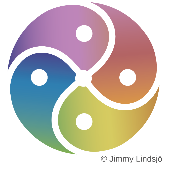



 NEXT
NEXT
 BACK
BACK
 Forum
Forum


Philosophical musings on Quanta & Qualia; Materialism & Spiritualism; Science & Religion; Pragmatism & Idealism, etc.




Post 122. January 29, 2022 continued . . .
Unscripted Free Will
Afterthoughts and End Notes 5
These are some marginal notes to Self while reading the book by Peter Carter. They are my own thoughts regarding topics he mentions in his text.
• Transcendence :
“Entangled particles transcend space and time . . . The whole idea is absurd, reality cannot work that way. Except it does.”
Einstein’s Block Time24 freezes space-
• Holism :
“All beings are part of the Whole. Their actions do not come from their own free will, but as expressions of its laws.”
___Chuang Tzu, Taoist philosopher
The Whole governs the parts. But each person is a holon25 (part with holistic properties). So, the self-
• Self-
“Do we have free will? . . . Must every event have a cause? . . . If the answer to the second question is yes, then the answer to the first one must be no.”
Is a self-
• Non-
“Either our actions are determined, in which case we are not responsible for them, or they are the result of random events, in which case we are not responsible for them.” ___Hume
Determinism is usually imagined as a simple linear chain of causation. But, in reality, the randomness of the universe results from an almost infinite array of causal forces coming in from all angles. So, a self-
• Intention is Causation :
“It’s so much easier to just go on presuming that somehow our brains operate in another dimension where causality does not pertain.”
There’s no need to imagine a fifth dimension of freedom from causation. It’s more likely that evolutionary forces, over billions of years of complexification27, have produced a self-
• Cultural Causation :
“Determinism undermines the foundation of social structure by removing personal responsibility.”
Natural evolution has created the complex social structures of ants & bees. But individual ants function like centrally-
Blog Post 122


 continued . . .
continued . . .

GOODNESS
“Humanism is the ethical system favored by atheists and agnostics that can be endorsed by keepers of the faith. With no equation of morality with immortality, it sontends that mankind can be good, should be good, for goodness sake — that idealist-
Chapter IV:14
Yes, but how can we choose between good & evil without Free Will? Do what comes naturally?
24. Block Time :
Einstein’s hypothetical version of timeless eternity would allow inter-
25. Holon :
“A holon is something that is simultaneously a whole in and of itself, as well as a part of a larger whole. . . . The holon represents a way to overcome the dichotomy between parts and wholes, as well as a way to account for both the self-
https://en.wikipedia.org/wiki/Holon_(philosophy)
26. Feedback Loops :
“Feedback loops are an important feature of complex adaptive systems.”
https://code.org/curriculum/science/files/CS_in_Science_Background_papers.pdf
27. Complexification :
Like multiplication, it is more than simple addition. Like evolution, it ramifies into novel forms. Like Holism, it entangles multiple parts into an integrated system with novel properties.
28. Cultural Causation :
Human culture has evolved more rapidly than Nature into endless forms most useful to human purposes.
Animals seem to have no universal concept of Good or Evil. So they always do what comes naturally. The big fish kill & eat the little fish, because that’s the way of hierarchical Nature. Our lovable dogs have no compunctions about killing and eating living creatures for whom death is not a good thing.
But humans have developed the ability to generalize specific positives and negatives into the cultural concept of good behavior and bad behavior. And they make Cultural laws to fill the moral gaps in Natural laws. So, how did randomized evolution produce creatures with that can over-

The Single Simple Question
That challenges All Convictions
Peter Carter MD
Primary Care Physician
“Connecting the conundrums of God and Immortality, Free Will, the Strange Reality of Quantum Physics, and Finding Purpose in Existence”.
Integrated
Systems
